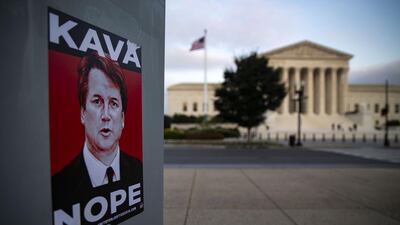Negotiators reached a tentative agreement on Saturday for the Senate Judiciary Committee to hear testimony on Thursday from Christine Blasey Ford, the woman accusing Supreme Court nominee Brett Kavanaugh of sexual assault from decades ago.
Lawyers for Mrs Ford and bipartisan representatives of the committee came to the tentative agreement after a short phone call.
Some details of the hearing, such as the order of their appearance, remained in negotiation. Talks were expected to continue on Sunday.
The tentative accord could bring to a close days of high-stakes brinkmanship that have roiled Washington ahead of midterm elections and threaten to jeopardise Mr Kavanaugh's confirmation to the court.
Tensions have been running on overdrive since Mrs Ford, a 51-year-old college professor in California, went public with her allegation that Mr Kavanaugh assaulted her when they were at a house party in high school. Mr Kavanaugh, 53, an appellate court judge, denied the allegation and said he wanted to testify as soon as possible to clear his name.
Mrs Ford initially indicated she wanted to tell her story to the committee, but talks dragged on as her lawyers negotiated terms of her appearance.
Republicans grew frustrated as Mrs Ford's lawyers insisted on a hearing next Thursday rather than Monday or even Wednesday and made other requests, some of which the committee chairman, Sen Chuck Grassley, R-Iowa, rejected. Democrats, against the backdrop of the #MeToo movement, countered that Ford should be shown respect and given accommodation to tell her story.
________________________
Read more:
The Supreme Court controversy is testing the raison d'etre of Trump's presidency
Trump casts doubt on sexual assault claims against Kavanaugh
Deadline approaches for Brett Kavanaugh's accuser to come forward
________________________
As the talks continued, Mr Grassley countered that he would end the standoff by scheduling a Monday vote on whether to recommend Mr Kavanaugh's nomination to the full Senate. Meanwhile, Republicans viewed Mrs Ford's requests as a way to delay voting on President Donald Trump's nominee.
Earlier Saturday, a senior official at the White House said Mrs Ford's requests amounted to "a clever way to push off the vote Monday without committing to appear Wednesday." The official was not authorised to publicly discuss the negotiations and spoke on condition of anonymity.
The White House views Mrs Ford's potential testimony with trepidation, nervous that an emotional performance might not just damage Mr Kavanaugh's chances but could further energise female voters to turn out against Republicans in November.
Moreover, the West Wing aides who had urged Mr Trump to remain muted in his response to the accusations worried about how the president might react if she ended up partaking in an hours long, televised hearing. In a single tweet Friday, Mr Trump broke his silence to cast doubt on Ford's story in ways Republicans had been carefully trying to avoid.
Trump mused to confidants that the "fake" attacks against his nominee were meant to undermine his presidency, according to a White House official and a Republican close to the White House. Both spoke on condition of anonymity because they were not authorised to discuss private conversations.
Other Republicans had scoffed at Ford's willingness to tell her story. "When?" tweeted the No. 2 GOP Sen. John Cornyn of Texas, a member of the committee.
Ford attorneys Debra Katz and Lisa Banks had said that many aspects of Mr Grassley's latest offer were "fundamentally inconsistent" with the committee's promise of a "fair, impartial investigation." They said they remained disappointed by the "bullying" that "tainted the process."
Earlier Saturday, Vice President Mike Pence called Mr Kavanaugh "a man of integrity with impeccable credentials." He expressed confidence that Republicans "will manage this confirmation properly with the utmost respect for all concerned" and said he expected Mr Kavanaugh to join the high court soon.

